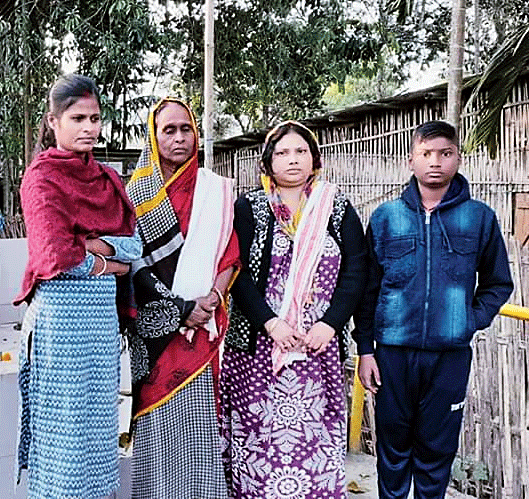The family members of victims of suspected Ulfa massacres in Tinsukia district of Upper Assam say the government should withdraw Citizenship Amendment Act (CAA) that aims to settle foreigners and, instead, lay stress on the state’s security measures and jobs and welfare schemes for the citizens.
“We, like other communities, are worried about CAA. It is an anti-Assam Act which violates the Assam Accord and the secular nature of the Constitution. We will never accept it. If Assamese language, which is also our language, and Assamese identity is affected, we will always come forward to safeguard them. We will protest in a peaceful and democratic way in solidarity with all communities,” Geeta Devi, widow of Satya Narayan Gupta who was killed in the Ulfa massacre at Longswal in Tinsukia district on January 5, 2007, told The Telegraph.
That night, Ulfa had orchestrated a three-hour orgy of violence in Upper Assam killing 48 people from Bihar and Bengal. In nine near simultaneous raids, Ulfa militants mowed down 34 people in Tinsukia, 8 in two separate incidents in Dibrugarh district and 6 in neighbouring Dhemaji district. Tinsukia bore the burnt with six incidents — the biggest at Sadiya where 13 people were shot dead, 11 were gunned down at Longswal and 10 in the four other attacks.
Geeta Devi said the government had promised to bear the educational expenses of the victims’ children but it was stopped in January 2017. Promises of jobs for family members of the victims have also not been met.
“I appeal to the government to give security, educational assistance and jobs to citizens instead of granting citizenship to illegal foreigners. The family of one of the victims, Aashu Dey, left this place out of fear but we still don’t have the promised police outpost here.”

Nandlal Shah, Kajal Shah, Kishori Lal Shah, Rajesh Shah and Lakshmi Gor with her daughters
Malti Shah, widow of Nandlal Shah and mother of Kajal, who were killed in an Ulfa (I) attack at Phillobari in Tinsukia district on July 14, 2015, said, “Many a time, we hear of encounters between Ulfa (I) and security forces in these areas. The attacks on Bengali-speaking people at Dhola and on a settlement of milkmen and cattle-rearers at Charkholia Sapori (a remote sandbar situated in the middle of the Brahmaputra in Dibrugarh district) in recent years have increased our fears. In place of CAA, the government should look after security measures of the state.”
Arvind Shah, a farmer who lost his father Kishori Shah and brother Rajesh Shah in a suspected Ulfa (I) attack at Bamungaon in Phillobari on August 12, 2016, said, “We are determined to uproot illegal migrants from Bangladesh by protesting against CAA. The foreigners threaten Assam’s existence, language and culture. The government should withdraw CAA and lay stress on security measures in the state and its border with Bangladesh, provide jobs and implement welfare schemes. We are all brothers and will together fight CAA in a peaceful and democratic way.”
Lakshmi Gor, widow of Baban who also died of bullets injuries in the Bamungaon massacre, said, “I live here and will die here. I support what is good for the state and its people. We need jobs, education for our children and security, nothing else.”
The family members of the five Bengali-speaking persons who were killed in a suspected Ulfa (I) attack at Dhola in Tinsukia district on November 1, 2018, suffer from the same anxiety. They, too, oppose CAA and seek security and jobs from the government.
Tinsukia has long history of linguistic groups, who trace their origins from outside the state, being targeted. Yet it is also a place which has been shaped by layers of migration going back to centuries. The district has a sizeable population of Bengalis, Bhojpuris, Rajasthanis and Gorkhas.
The problem of “foreigners” in the state had given rise to the Assam Agitation (1979-85), during which 855 people died.
The Accord says anyone who entered the country after the midnight of March 24, 1971 would be deemed a foreigner. The CAA seeks to grant citizenship to members of six non-Muslim communities from Bangladesh, Pakistan and Afghanistan who entered India till December 31, 2014.










